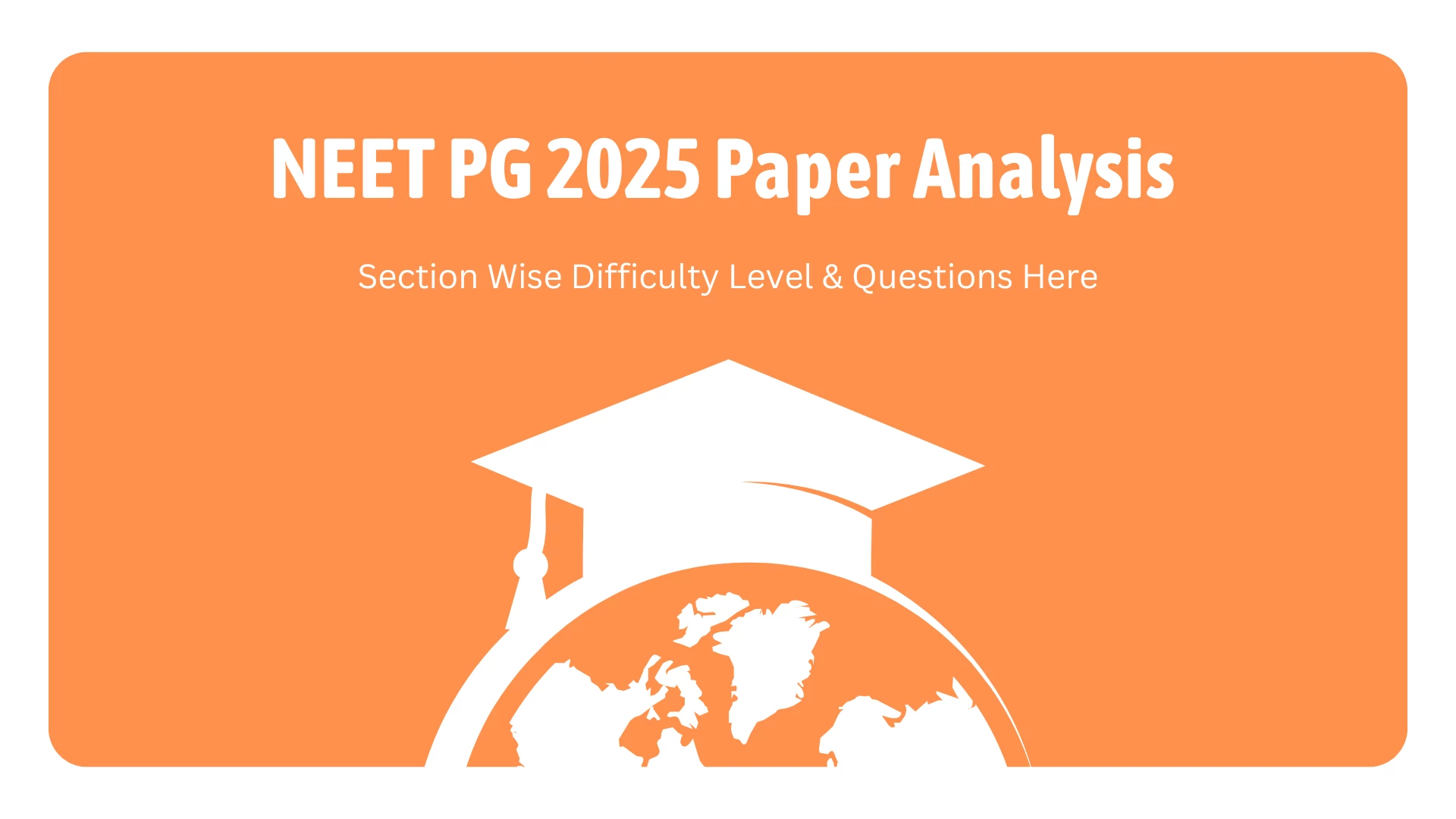The following table contains section wise difficulty level of NEET PG examination conducted on August 3, 2025.

| Subject/Section | Difficulty Level | Remarks |
|---|---|---|
| Anatomy | Moderate | Some image-based, mixed conceptual/factual |
| Physiology | Moderate | Focus on core concepts and clinical cases |
| Biochemistry | Moderate to Difficult | Few fact-based, enzyme and pathway heavy |
| Pathology | Moderate | Many clinical integration questions |
| Pharmacology | Moderate | Drug mechanisms, adverse effects emphasized |
| Microbiology | Moderate | More case-based than previous years |
| Forensic Medicine | Easy to Moderate | Mostly direct, fact-based questions |
| Social & Preventive Medicine (SPM) | Moderate | COVID-era policies, screening tests, stats |
| Medicine | Moderate to Difficult | Case-heavy, clinical reasoning required |
| Surgery | Moderate | Clinical decision-making questions |
| Obstetrics & Gynecology | Moderate | Some repeats, protocols, emergencies covered |
| Pediatrics | Easy to Moderate | Immunization and milestones covered |
| ENT | Moderate | Mostly clinical, a few one-liners |
| Ophthalmology | Easy to Moderate | Image-based, mostly scoring |
| Dermatology | Easy | Straightforward image-based questions |
| Radiology | Moderate | Mostly image-based, diagnostic reasoning |
| Psychiatry | Moderate | Conceptual with few fact-based items |
| Orthopedics | Moderate | Trauma, fractures, and emergency management |
| Anesthesia | Moderate | Basic drugs and equipment-based questions |
Subject High-Weightage Topics Focus Area
| Subject | High-Weightage Topics | Focus Area |
|---|---|---|
| Medicine | Cardiology, Neurology, Infectious Diseases, Respiratory | Case-based clinical scenarios |
| Surgery | GI Surgery, Trauma, Urology, Thyroid, Hernia | Decision-making and diagnostics |
| Obstetrics & Gynecology | Obstetric Emergencies, PPH, Antenatal Care, Contraceptives | Protocols and stepwise management |
| Pathology | Neoplasia, Inflammation, Hematology, Immunopathology | Conceptual + clinical correlation |
| Pharmacology | Autonomic Drugs, Antimicrobials, Adverse Effects | Drug mechanisms and side effects |
| Microbiology | Virology, Bacteriology, Sterilization, Immunology | Case-based infection questions |
| PSM (SPM) | Screening Tests, Biostatistics, Epidemiology, Vaccines | Applied public health approaches |
| Pediatrics | Growth Milestones, Vaccines, Neonatology, Emergencies | Direct + application-based questions |
| Radiology | Chest X-ray, CT Brain, USG Abdomen | Image interpretation |
| Anatomy | Neuroanatomy, Embryology, Upper Limb | Structural-functional correlation |
| Physiology | Cardiovascular, Renal, Respiratory | Basic concepts + applied logic |
| Biochemistry | Enzymes, Metabolism, Nutrition, Vitamins | Pathway-based MCQs |
| Orthopedics | Fracture Management, Bone Tumors, Nerve Injuries | Emergency and trauma focus |
| Dermatology | Common Skin Disorders, STDs, Vesiculobullous Disorders | Image-based and one-liners |
| Psychiatry | Schizophrenia, Depression, Drug Dependence | Diagnostic criteria & drugs |
NEET PG Analysis | Highest Weightage Topics in Exam
Candidates can check out the complete list of highest weightage topics from each subject in NEET PG examination 2025.
NEET PG Paper Analysis 2025 | Students Reaction
-
The exam overall was moderate to difficult, and had a higher proportion of clinical questions than in previous years.
-
The exam assigned the most weight to Medicine and Surgery, and required a greater level of clinical reasoning.
-
There were a fair number of case-based questions in which the exam tests a person’s real-life diagnostic and treatment abilities and skills.
-
There was some concern amongst students that the exam presented lengthy clinical scenarios, and many felt time management to be an issue due to time-consuming clinical scenarios.
-
There were not as many one-liner questions, but there were instead MARF (multiple aspects, relative form) questions that included more than one subject/topic.
-
There were a strong number of image-based questions, predominantly basic images (particularly) in Radiology, Derm, and Optho.
-
SPM included tricky questions relating to facts, virtually all on policy, while Pharmacology included reality and also tricky policy type questions.
-
Providing exam topics from registrars and senior doctors, many suggested that there were a lot of common topics relating to OBG emergencies, infectious diseases, and, antimicrobial therapy but not ethically considered or de-time constrained.
-
Many candidates reported a good amount of overlap with previous exams in terms of topics.
-
Biochemistry and Physiology had substantially smaller representation than clinical-related subjects compared to the examination subject weighting.
-
Students noted that the more questions were more framed conceptually rather than requiring direct recall of facts when compared to previous years.
-
Many students indicate they thought the paper was balanced but mentally hard, especially for the last 50 questions.
-
While many students agreed that the cutoff would likely be maintained similar to the year before as they considered the level of questio